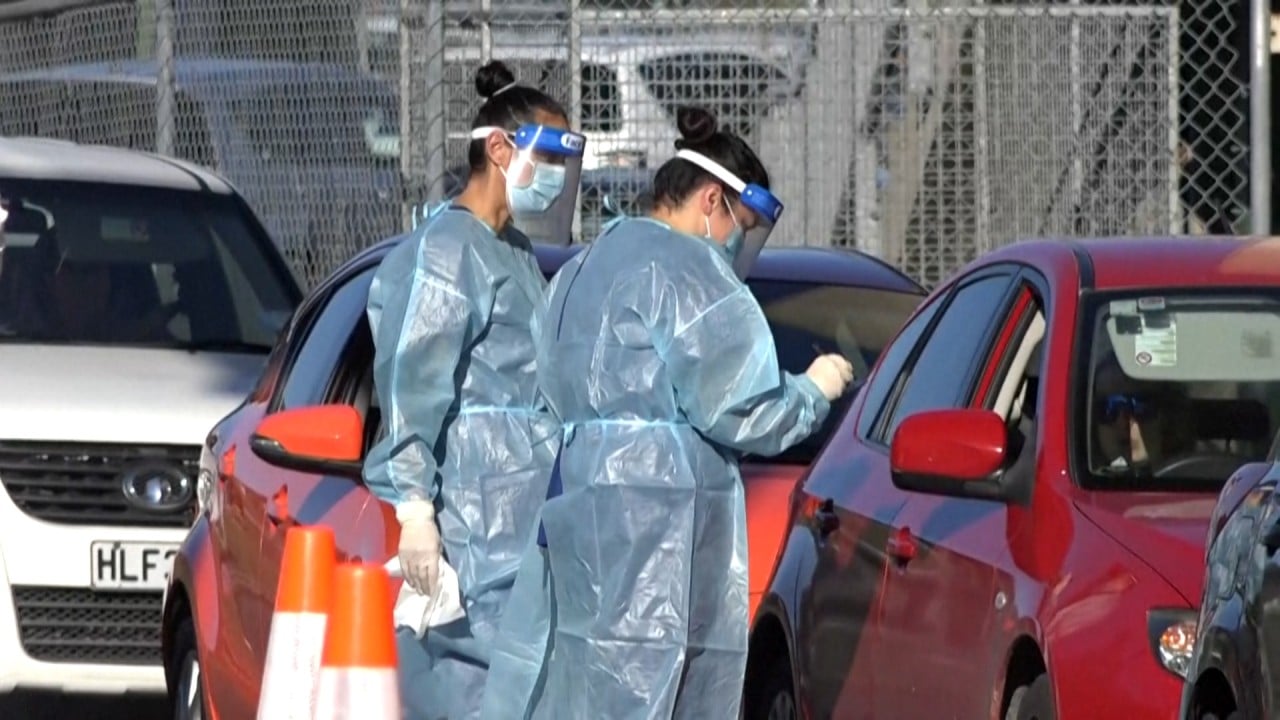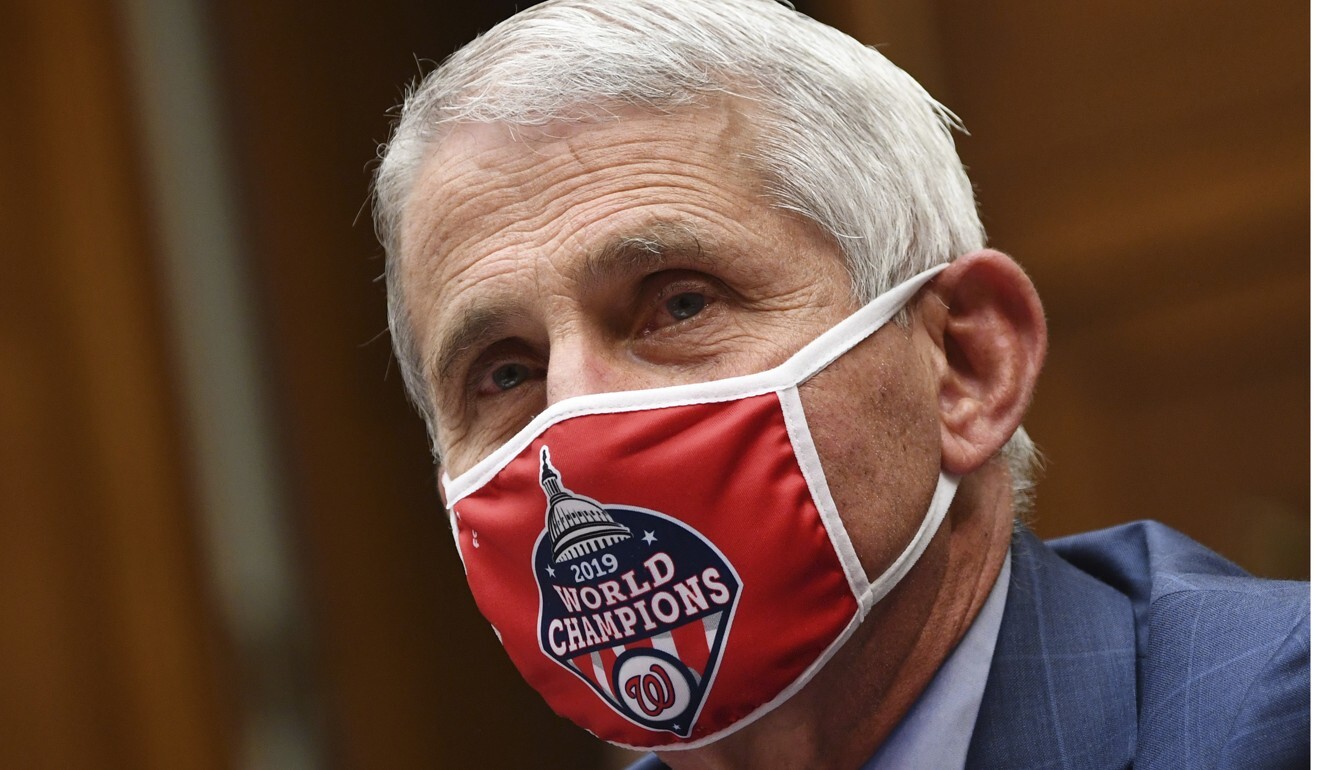
Coronavirus: US calls WHO ‘corrupt’, won’t join global vaccine effort
- US decision to go it alone follows White House decision in early July to pull the United States out of the WHO
- President Donald Trump claims the WHO is in need of reform and is heavily influenced by China
The White House said that the United States would not join a global effort aimed at providing equitable worldwide access to Covid-19 vaccines, citing the project’s link to a “corrupt” World Health Organisation (WHO).
More than 170 nations are in talks to join the vaccine initiative, known as Covax, which has already received a €400 million (US$475 million) pledge from the European Commission.
The effort is organised by the vaccine alliance Gavi, the Coalition for Epidemic Preparedness Innovations (CEPI) and the WHO.
In a statement White House spokesperson Judd Deere said the US would “not be constrained by multilateral organisations influenced by the corrupt World Health Organisation and China”.
Pupils are back at school in Europe as coronavirus cases pass four million
“This president will spare no expense to ensure that any new vaccine maintains our own FDA’s [Food and Drug Administration] gold standard for safety and efficacy, is thoroughly tested, and saves lives,” Deere added.
The global effort to develop a vaccine against the virus, which has killed almost 855,000 people, has seen recent launches of late-stage trials, but work on treatments has also gone into overdrive.

02:07
Global coronavirus cases surpass 25 million as India deals with world’s fastest-growing outbreak
There is no approved coronavirus vaccine, except one authorised in Russia before large-scale trials.
FDA Commissioner Stephen Hahn told the Financial Times in an interview published on Sunday that his agency was prepared to authorise a coronavirus vaccine before late-stage Phase Three clinical trials were complete, as long as officials are convinced that the benefits outweigh the risks.
Phase Three trials, in which randomised patients are treated with a drug or a placebo without participants or doctors knowing which group they were in, are considered the gold standard for clinical trials.
Coronavirus: one-third of Americans would refuse vaccine, survey finds
On Monday, WHO officials said rushing to make a vaccine widely available could pose risks.
“If you move too quickly to vaccinate … millions of people, you may miss certain adverse effects,” said Mike Ryan, the head of WHO’s emergencies programme.
WHO chief scientist Soumya Swaminathan said the FDA’s approach was “not something that you do very lightly”. She said the WHO’s preferred approach would be to have a full set of data which could be used for the pre-qualification of vaccines.
Trump has been critical of the WHO’s handling of the coronavirus pandemic, accusing it of being too focused on China and issuing bad advice. In May, Trump announced the United States was cutting ties to the organisation.
Trump’s administration has signed contracts guaranteeing at least 800 million doses from six manufacturers for a population of 330 million, to be delivered starting at the end of the year for some of the doses.
CEPI’s chief executive officer Richard Hatchett said he understood national leaders were serving their own people as a priority, but called on Washington to behave like a global leader and share its doses with other countries.
Russia’s coronavirus tally passes 1 million, world’s fourth highest
“What we need to persuade global leaders is that as a vaccine becomes available in these initially limited quantities, it needs to be shared globally, that it shouldn’t be the case that just a handful of countries get all of the vaccine that is available in the first half of 2021,” said Hatchett, who wants at all costs to avoid the scenario of 2009, when rich countries managed to bag the first vaccines of the H1N1 flu. “I am concerned about it,” he said.

Covax has only managed to secure 300 million doses to date from AstraZeneca, the pharmaceutical group that also signed separate partnership deals with the United States, Europe, Russia, South Korea, China, Latin America and Brazil. Novavax, a US biotech company, says it has formed a partnership with an Indian group to produce up to a billion doses of its potential vaccine in India.
The ideal goal for the WHO is that every country receives vaccinations for 20 per cent of its population, starting with the most vulnerable people no matter what their nationality, including health workers.
Meanwhile Dr Anthony Fauci, the director of the US National Institute of Allergy and Infectious Diseases, pushed back against Trump’s purported doubts about the high US coronavirus death toll.
“There are 180,000-plus deaths – (those) are real deaths from Covid-19. Let (there) not be any confusion about that,” Fauci said in an ABC News interview.
Goodbye, nasal swabs? Saliva tests can detect coronavirus infection, studies show
Fauci was seeking to explain a Centres for Disease Control and Prevention report that the vast majority of people who died from coronavirus also had underlying health woes like hypertension or diabetes.
“It’s not 9,000 deaths from Covid-19, it’s 180-plus thousand deaths,” Fauci said.
The doctor spoke out after Trump retweeted a fan of the QAnon conspiracy theory suggesting that the CDC report meant that the official coronavirus death toll was bogus.
Trump criticised Fauci on Monday, reminding Americans that he did not appoint the pandemic expert, who has worked under presidents of both parties.
“I inherited him,” Trump said in an interview with Fox News. “He was here. He was part of this huge piece of machine.”
Trump added that he often disagreed with Fauci, although he did not elaborate.
The president has repeatedly sought to undercut Fauci and other experts when they have offered scientific or medical advice that contradicts his political whims at any given moment.
Last month, he also lashed out at Dr Deborah Birx, another infectious disease expert who has generally been more supportive of Trump’s approach.
DPA, Reuters, Agence France-Presse, Tribune News Service
